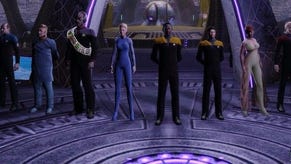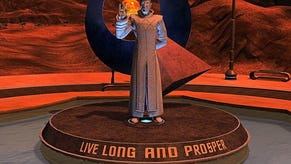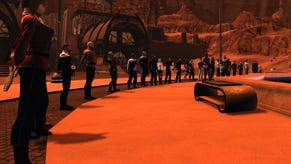Star Trek Online
Ready steady Kirk.
Allow "open instance" teaming and the game might throw you in with a couple of others who happen to be starting the same mission at the same time, but you probably won't speak to them. It's not like asking a passing stranger for help. The more successful examples of multiplayer gaming are the big 20-ship Fleet Actions and the repeatable Deep Space Encounters, which can be started and finished by a single player but gain an inevitable momentum as more and more players join looking for a quick mission completion.
More traditional "questing" is represented by Patrols, Episodes and Exploration. Episodes are mixed strings of space and ground combat hung on a story framework that usually has a pleasingly, identifiably Star Trek structure, even if it's an awful lot more violent than the TV series ever were. Patrols are groups of shorter capsule missions that still sometimes manage to deliver a satisfying nugget of narrative here and there.
Exploration was one of the game's most exciting prospects - randomised planets, species and missions that would lend the game that all-important sense of discovery, of being somewhere no player had gone before - but is a dreadful disappointment, consisting of basic, poorly-refined and endlessly-recycled mission templates with a few variables thrown in.
The problem is that all of these, and indeed Deep Space Encounters too, are built from the same few building blocks, and the action gets very repetitive very quickly. The same criticism can be levelled at questing in many MMOs, but Star Trek Online is lacking in the variation of location, the downtime, the social aspects, the way different missions interlock and the alternative activities that liven up other games and give each play session a sense of personal choice.
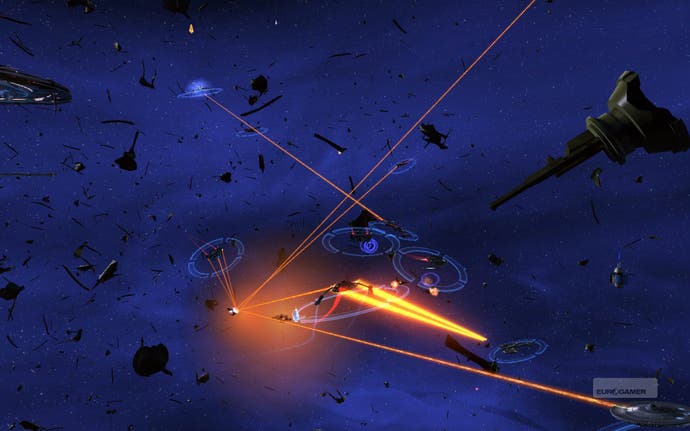
The diversions and alternatives simply aren't there. Crafting barely exists at all - you can "research" materials and trade them in for pretty meaningless upgrades at Memory Alpha. Skill points (experience, in other words) are heavily weighted towards mission completion, so grinding is a non-starter.
Cryptic has never been very good at loot, and Star Trek Online is no exception - there's too much of it, it comes too late in too fine gradations, and it's hard to tell the effectiveness of one item from the next. So pursuing treasured trinkets doesn't work as motivation either - it's just a case of clearing missions so you can do more missions. Levelling is slow and that next rank can seem awfully far away.
Star Trek Online does have potential as a player-versus-player game, but in its current form that's completely unrealised. This is a particular problem for players who choose to start a Klingon character, which unlocks quite early on at Lieutenant Grade 5, because PVP is all there is for Klingons to do.
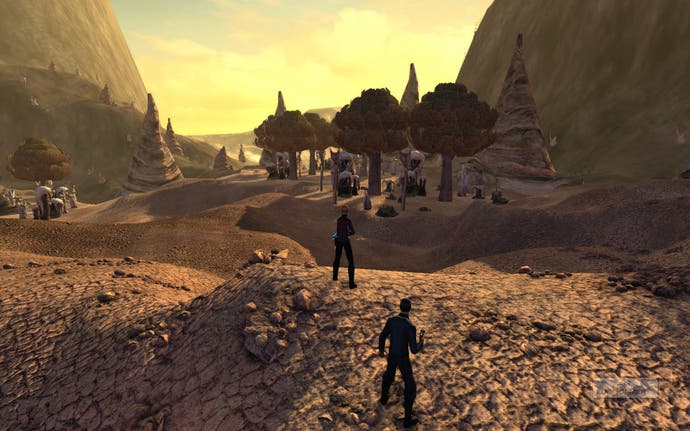
There is some insultingly basic mission content that's a variation of Exploration on the Federation side, and Klingons can fight each other and the Feds on a variety of undistinguished space and ground maps, but that's it. Players are miserable, and Klingon chat channels are among the most dispiriting places to hang out on the internet right now. This faction will need to get some serious love if it's to foster a community healthy enough to provide the happy hordes of Starfleet with proper competition.
Despite all of these complaints, those hordes of starship captains are quite happy. They may not have many different things to do, and the missions and UI may be rather buggy, but there does seem to be enough content to sustain them - at least until the endgame - and even at its worst that content is knockabout fun with more instant appeal, and more suitability for casual, short-session, low-commitment play than most MMOs.
And more spaceships too - Star Trek Online is in a field of one in terms of its theme, its only real rival being the intimidatingly complex and political EVE Online, right at the other end of the accessibility scale. It's a unique offering then, in many ways a loveable one, and for Star Trek fans if not MMO gamers it's a great social experience. It makes its licence a blessing, not a burden, but it's a blessing this rickety voyage into the unknown badly needs.

